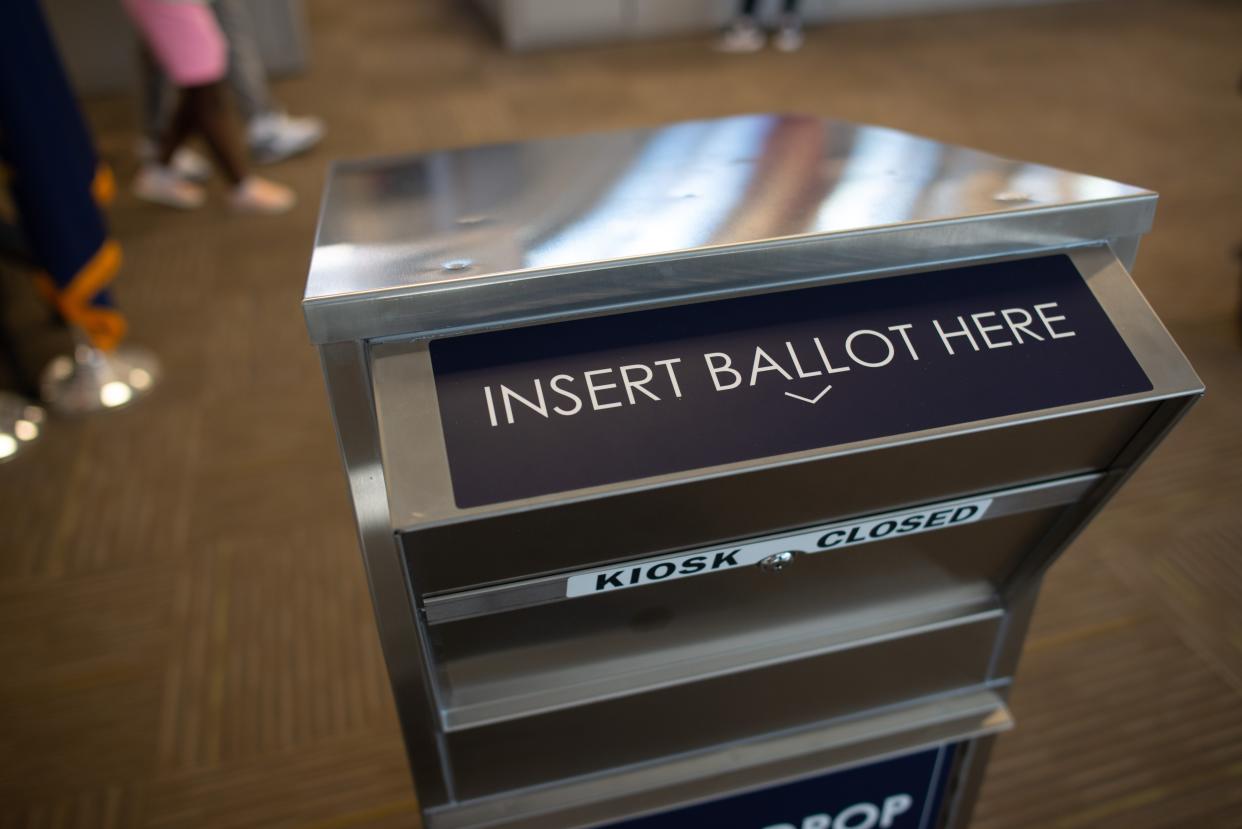Judge denies longshot effort to stop use of Kansas ballot drop boxes, voting machines

A federal judge in Kansas on Wednesday denied a conspiracy-laden effort to stop the use of ballot drop boxes and electronic voting machines in next month's election, part of a longshot lawsuit from election deniers that seeks to redo the 2020 and 2022 elections, among other aims.
The move comes on the same day election officials across the state have begun mailing ballots to voters, with early voting set to begin for the upcoming Nov. 8 general election.
Some of those involved with the lawsuit are also individuals who took part in a recount of the 2022 primary election based on unfounded allegations of fraud. Others have testified in legislative hearings on perceived flaws in Kansas election administration.
More:Audits, voting machines and TikToks: Mistrust sparks GOP race to be Kansas' top election official
Lawsuit relies on baseless fraud allegations in Kansas
The lawsuit, filed in the U.S. Court for the District of Kansas last month, relies on largely baseless allegations that the state has been using erroneous voting machines and has been the subject of fraud.
It wants Gov. Laura Kelly to void the 2020 general election and 2022 primary election results and order a redo, something that cannot be done under state law. It also wants elections in Kansas to be conducted entirely by paper ballots.
A separate motion lodged earlier this month seeks a temporary restraining order (TRO) to stop election officials from using ballot drop boxes and electronic voting machines in the November election.
It relies on the arrest of Eugene Yu, CEO of Konnech, which manufacturers election management software, earlier this month on allegations that some poll worker data was being stored on servers in China in violation of the company's contract with Los Angeles County in California.
Only one county in Kansas, Johnson County, is believed to have used Konnech and election administrators there have said the company is housing data for the county on servers in Michigan. That doesn't stop the TRO motion from arguing China "could use poll worker data to intimidate or influence elections in their favor to weaken America."
More:‘The Big Lie’ peddler argues Kansas elections aren't secure. Some legislators appear sympathetic.
Bradley Schlozman, the attorney representing the state, wrote in a response that the lawsuit was "a hodge-podge mini treatise of potential issues with electronic voting machines that Plaintiffs apparently believe the State must disprove."
The state has used both electronic voting machines and drop boxes for years without a legal challenge and changing that right before an election would be irresponsible, he said.
Ruling largely critical of rhetoric in longshot election lawsuit
U.S. District Judge Daniel Crabtree indicated during a hearing Friday that he was unlikely to grant the motion and his ruling largely picks apart the case made by the plaintiffs. It is largely pessimistic about the odds of the larger lawsuit to find any success.
Elected officials, he said, "have chosen processes and methods to use in the state’s elections."
"It may not represent the system that plaintiffs prefer, and our Constitution entitles them to express their opinions," Crabtree wrote. "But nothing in the current record entitles them to sweeping use of federal judicial power to impose their views on their state or their fellow Kansans."
Those bringing the lawsuit, Crabtree said, do not have the standing to do so, as they have not demonstrated they have been directly harmed by the issues they allege.
Even if they did have the ability to bring the lawsuit, Crabtree said they did not demonstrate the resolution sought by the restraining order actually would address the allegations they made.
"Plaintiffs provide no cogent, or even plausible answer for those questions," he said. "Their failure, the court finds, places any putative irreparable harm at the speculative end of the spectrum — and nowhere near the 'significant risk' required by our Circuit’s standard."
State lawmakers may well still consider banning the use of drop boxes, despite no evidence they serve as a conduit for fraud.
Some conservatives, however, have argued that state law does not explicitly authorize their use and that, at the very least, regulations should be crafted governing their use.
"Those on the left who say there is no election fraud are simply ignoring reality," former Secretary of State Kris Kobach, now running for Kansas attorney general, said while arguing for a drop box ban in a Tuesday debate.
Opponents have argued that proposals circulated during the 2021 session would effectively ban the boxes and make it harder for individuals to vote, particularly in areas where mail service is slow or unreliable.
Secretary of State Scott Schwab, a Republican running for re-election in November, is among those who have argued the practice is secure.
"I don't understand the angst with drop boxes," Schwab told the House Elections Committee in . "If I owed you $1,000, do you want me to put that cash and mail it to you? Or would you rather me drop it off?"
This article originally appeared on Topeka Capital-Journal: Judge rejects conspiracy theorist effort to stop Kansas drop boxes

